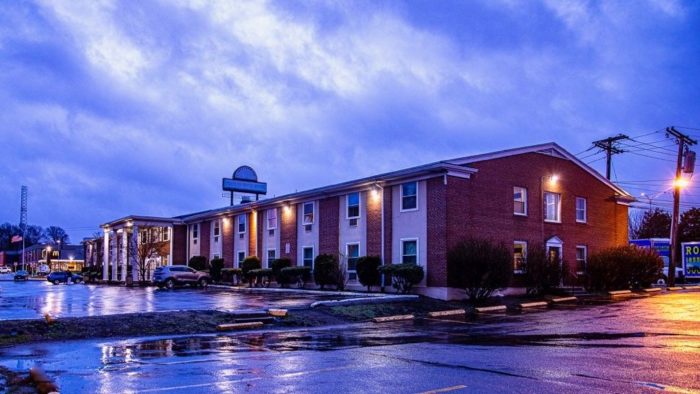The pandemic spurred the city to find new housing for people experiencing homelessness. Will these programs continue?
Last fall, City of Boston officials realized the annual increase in demand for homeless shelter space would be amplified by the pandemic. In response, they approached shelters in the area and asked them to help with new sites. One of these organizations was St. Francis House, whose staff agreed to manage a new facility at the former Charles River Inn.
St. Francis was able to repurpose the hotel’s property as a non-congregate shelter space. Residents have a place for themselves and another roommate, as opposed to the barracks-style arrangements of congregate shelters. Those shelters, characterized by large but shared and cramped sleeping and eating areas, have long been the dominant method of managing homelessness because of the cost-effectiveness of cramming as many people as possible into a space.
During the pandemic, homeless shelters faced new challenges presented by social distancing mandates and public health regulations. Simultaneously, motels and hotels have seen vacancies at an all-time high. This perfect storm has given shelters a chance to use that vacant space to help people who need a place to live.
Joe Finn, president and executive director of the Massachusetts Housing and Shelter Alliance, advocates strongly for non-congregate shelters, settings that give residents their own space, like a room, as opposed to the overcrowded and potentially unhealthy congregate model. He praises non-congregate shelters as being a superior way to recovery, as the individualized setting provides stability and peace of mind for residents that can only come from having your own space.
“The real advantage the non-congregate setting provides,” Finn said in an interview, “is that you can close the door behind yourself. That you have a sense of privacy. It’s a level of dignity that’s missing in the contexts of these other types of programs.”
In practice, the non-congregate shelter seems to provide other benefits as well, according to residents in St. Francis’s current program. Outside the Charles River Inn, some residents shared their experiences over the commotion of cars on the nearby streets.
Stephen Lightizer, one of the residents since December when St. Francis opened the Charles River Inn shelter, has been a fan of the arrangements. “They feed you, they give donations, clothe you when you need it, obviously a roof over your head,” Lightizer said. “In these tough times that’s a help.”
Lightizer previously stayed in Boston’s 112 Southampton shelter, a congregate men’s shelter, and said the experience at the Charles River Inn was vastly improved by having his own space.
“This place helped me out a lot,” he said. “Instead of being in a shelter, crowded in with a lot more people, it’s a lot better here. I really like it here.”
Another resident of the Charles River Inn, who asked to only be identified as Justice, talked about the freedoms he was able to exercise as a result of the program’s structure. In congregate shelters, to maintain a headcount and for safety and security, residents usually have to sign in and out of their shelter and generally be supervised. At the hotel, there is only a general curfew.
“With more freedom, comes more responsibility though,” Justice said. “They let us come and go until curfew, so some people go over to the McDonald’s or come out to smoke.”
Justice also praised the staff at the Charles River Inn, saying that they’re working to help their residents into stable housing and jobs.
“The people here are good people,” Justice said. “The program here is geared to minimize homelessness, and the people are trained for rehousing.”
Justice also said he was well on his way to proper rehousing, having obtained his rent voucher through St. Francis House, with his focus set on restoring his commercial license so he can get back to trucking. “I’ve got my voucher,” Justice said, “So I’m looking for a place, and then I can work on my license.”
With the benefits felt by the residents of the Charles River Inn, advocates say it’s unfortunate that the individualized shelters aren’t more common. There are many obstacles to establishing them, like cost and available real estate. Meanwhile, large shelters like Pine Street Inn have constructed new developments of high-density low-income housing to alleviate homelessness as supportive housing, geared at helping residents get to the services they need.
As the pandemic wanes, many of the agreements that allow for these non-congregate solutions to thrive are coming to an end. With the Charles River Inn, St. Francis’s lease is due to expire by the end of April. Finn hopes that people can find ways to prolong the non-congregate solution into the norm, his fear being that the congregate shelters become institutionalized.
“I just don’t want mass shelters institutionalized, to become the acceptable housing niche for so many people,” Finn said. “I housed a person with 30 years in a shelter, all of his adult life, and that’s just not right.”
Finn hopes that shelters and other relief organizations will be able to fend for themselves and continue exploring more beneficial methods of housing beyond the pandemic as well. “We have to do everything we can to demonstrate to them that we don’t think (mass shelters) are appropriate any longer,” Finn said. “And we hope that providers across the Commonwealth take a stand and say no, we’re not going back (to mass shelters), we can’t do that helpfully.”
Mark Emmons is a Bay Area and Boston-based journalist and photographer. Since he was a kid he's wanted to tell stories, and now he does his best to tell those of others with his pen and camera.


